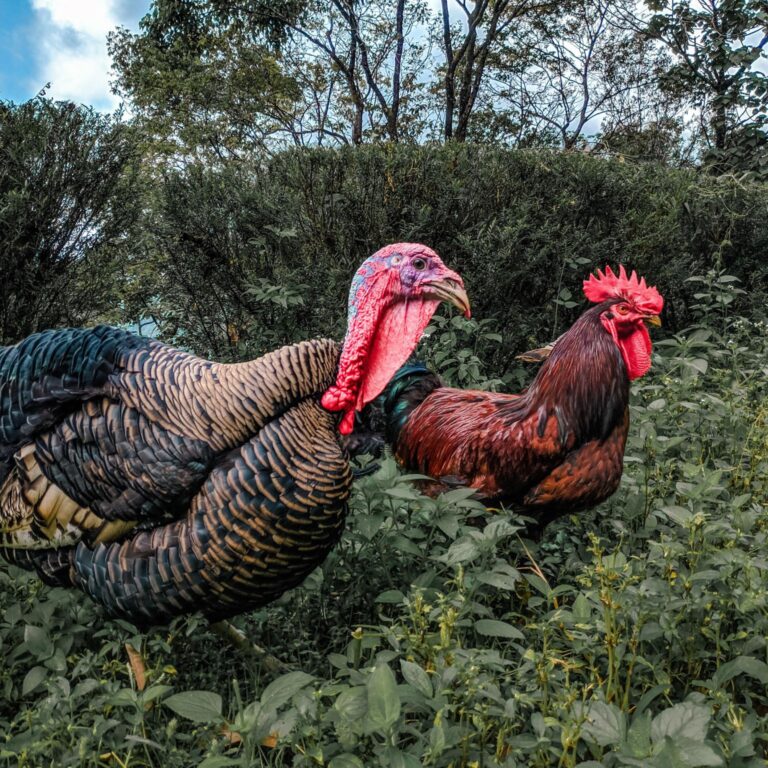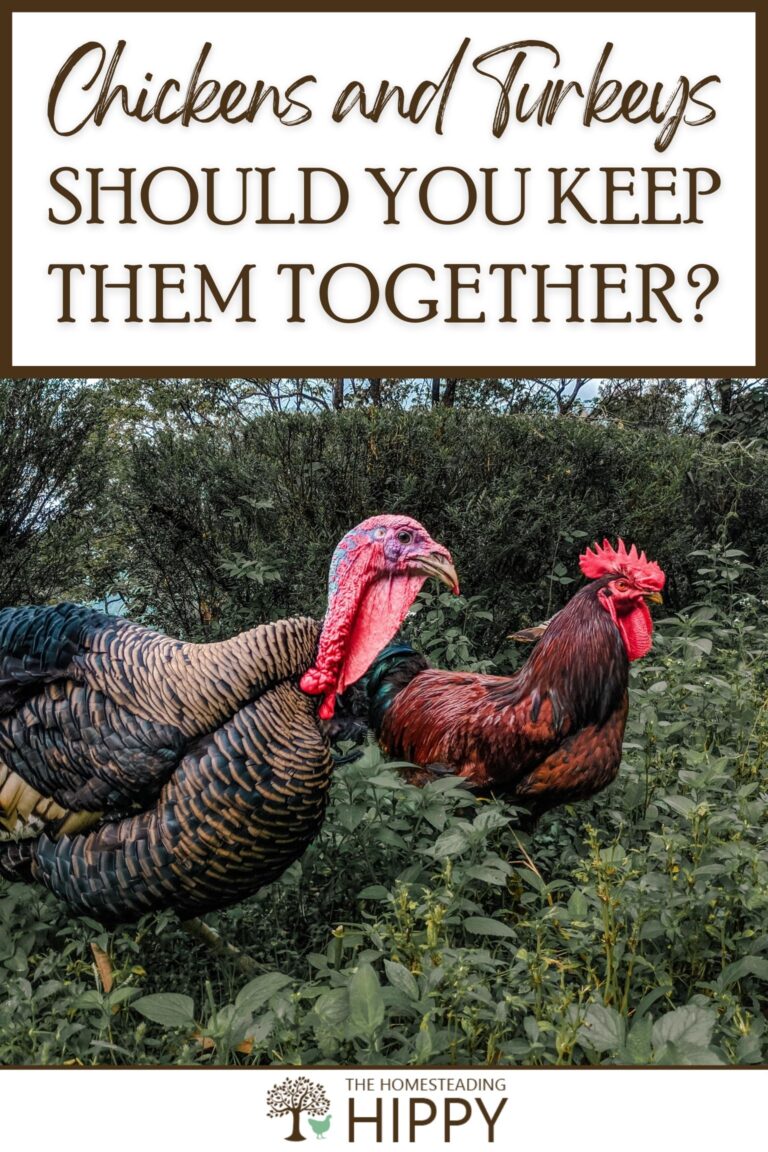If you own chickens, you already know they generally don’t get along with other birds too well. Chickens can be picky about their flock mates and may not take kindly to newcomers, be they ducks or geese, even if those newcomers are just other chickens! Chickens, it seems, are the cliquey jerks of the bird world.

Nonetheless, a quick search on the internet seems to suggest that some people do indeed manage to keep turkeys with their chickens, or at least near them some of the time. How strange.
You’d think chickens would go berserk over a bird that size in their space. So, should you keep turkeys and chickens together?
Yes, you can keep turkeys and chickens together most of the time. Most chickens seem to accept turkeys as their calm demeanor does not aggravate chickens. They may need to be housed separately, though.
The good news is that yes, you can keep chickens and turkeys together, and they will probably get along just fine. They sure seem like strange companions at first glance, but there are some legitimate benefits to doing so.
You will, however, need to be aware of a couple of serious problems that might arise. Keep reading and we’ll tell you all about it.
Do Chickens and Turkeys Get Along?
Believe it or not, turkeys seem to be the one bird that chickens get along with more often than not. Ducks, eh, take them or leave them. Geese, probably not, and they can actually be dangerous to chickens. Some of them are as ornery as chickens! But turkeys tend to get a pass.
This is likely because turkeys are much larger birds, and chickens tend to be somewhat intimidated by them.
And turkeys also generally have a far more docile personality, which again, works in their favor when it comes to getting along with chickens.
This size and strength advantage combined with their typical “gentle giant” personality when domesticated often leads to peaceful cohabitation with the rest of your flock, even if they typically mind their own business around each other.
What Behavioral Differences are There Between Chickens and Turkeys?
The general attitudes and idiosyncrasies of chickens and turkeys are as different as night and day.
Chickens tend to be rather high-strung, and are constantly on the lookout for potential offense or danger, whether it be a hawk or just another chicken trying to steal her food. Turkeys, on the other hand, are much more mellow and relaxed.
Chickens will dart all over the place at the slightest excitement whereas turkeys rarely move anywhere faster than their slow, measured trot unless it is really serious.
This difference in personality is likely what contributes most to the peace between these two very different kinds of birds.
Chickens can get worked up over practically nothing, even toward the turkey, but turkeys will so much of the time just sit back and take it all in stride.
This even-keeled temperament prevents most conflicts from arising between the two species.
And beyond this, turkeys tend to bust up fights between chickens, acting as peacekeepers. They may even be the “alpha” rooster figure if male chickens are present (though they lack the attitude). This behavior is especially prevalent among hen turkeys.
Turkeys Can Help Keep the Flock Safe from Predators
One of the best perks associated with keeping a turkey with your flock is that they can help to ward off predators.
Chickens tend to be on the lookout for danger at all times but their small size makes them vulnerable to just about any land-based predator, from weasels to raccoons to coyotes.
Turkeys, on the other hand, are absolutely massive compared to chickens and can put up quite a fight if need be.
Their size and strength often ward off potential predators before they even have a chance to strike, giving your whole flock a better chance of surviving an attack unscathed.
They can also stomp the guts right out of rats, mice, and snakes, and only the largest birds of prey will make a pass at turkeys.
Can Chickens and Turkeys Eat the Same Food?
Yes, generally. However, turkeys and chickens do have different nutritional requirements. Most importantly, turkeys need even more protein than chickens do.
You have nothing to worry about if turkeys nab a little chicken feed and chickens get a little bit of turkey feed, and they can share many of the same supplemental foods.
But you will want to make sure that the chickens don’t get to take food from your turkeys on a regular basis. If needed, you might need to feed the turkeys in their own enclosed area or put a chicken wire barrier around their food to prevent thievery.
You might want to look into a higher protein feed specifically made for your turkeys, which will help them stay healthy and give them the nutrients they need to grow properly.
You can find these at most feed stores that sell poultry feed. And, as always, do watch out for food aggression, no matter how calm your flock is the rest of the time.
Do Turkeys Need Their Own Space?
This really depends on how many of each bird you have. In general, you will need more than double the space for each turkey than you would for a chicken. These big birds just take up a lot of space!
If you want your flock to have plenty of room to roam, range, and generally move around without causing stress, you’ll need to allocate even more to account for a turkey and lots more for multiple turkeys.
Can You Keep Chickens and Turkeys in the Same Coop?
Believe it or not, it may well be possible… though it is not guaranteed. Roosting behavior and bedtime are always touchy for chickens, and the requirements of both chickens and turkeys vary quite a bit.
Chickens like to roost in elevated, enclosed, secluded spots where they will be sheltered from the elements and potential predators.
On the other hand, turkeys like to sleep on the ground, on a branch or in more open areas so they can keep an eye out for danger.
If you have a very large coop with adequately sized branches or boards for your turkey’s larger feet, it is possible that both kinds of birds will be able coop together.
But do keep in mind that your chickens might simply not go for this arrangement. Pay close attention to signs of stress or aggression, and never lock your turkey up in a coop with chickens at night until you are 100% sure they all sleep through the night peacefully.
Are There Any Risks to Keeping Chickens and Turkeys Together?
While there certainly are benefits to keeping these two kinds of birds together, there are some risks you need to be aware of as well.
First, there is the issue of food aggression, as mentioned before.
If you have one gluttonous turkey who loves to eat chicken feed or a particularly greedy chicken that’s constantly stealing food from the turkeys, this can throw off the whole flock’s nutrition and cause problems down the line.
Keep an eye out for any birds that seem to be losing weight or not getting enough to eat, and take steps to correct the problem immediately.
What Happens if Chickens and Turkeys Fight?
As mentioned, turkeys and chickens seem to get along pretty well, against all odds. But, there is always the potential for problems. Toms in particular will jockey for dominance with people and chickens alike.
Fights, even social ones, among the species are not unheard of. And if it happens that can spell real trouble for any chicken.
Let’s compare the contenders: an adult chicken weighs in at about 3-5 pounds on average, give or take. A tom turkey? 20 pounds easily.
Bigger, far stronger, and with spurs that will put a rooster to shame, a turkey can kick the hell right out of a chicken, and easily kill it.
The good news is that these kinds of problems are relatively rare. But if you do have an aggressive bird on your hands, you may need to keep him separated from the rest of the flock.
Caution: Diseases are Transmissible from One to the Other
Another factor and one that is far more likely to cause problems is disease. Chickens and turkeys are subject to different illnesses, and there are many they share with each other… sometimes with lethal results.
Avian influenza, for example, is a virus that can infect both kinds of birds. Another and far more dreaded disease is blackhead disease.
Blackhead Disease is Extremely Deadly for Turkeys
Blackhead disease is a protozoan infection that is extremely persistent and affects both chickens and turkeys, though it is almost always fatal for the turkeys.
This nasty bugger can be passed from one bird to another through contact and feces, or even from worms and bugs that touch or each infects feces.
In the right conditions, it can persist even in the soil for three years! It is incredibly hard to contain, much less halt, once it affects a flock.
If you have both kinds of birds in your flock, you need to be aware of the risks and take steps to protect your animals as much as possible, but this is more a matter of luck than anything as the disease can even carry on the wind.
You must understand that your turkeys are probably going to be finished if they catch it from the chickens, which can sometimes just be carriers of the disease.

Tom has built and remodeled homes, generated his own electricity, grown his own food and more, all in quest of remaining as independent of society as possible. Now he shares his experiences and hard-earned lessons with readers around the country.
Find out more about the team here.

Loved this! I have 4 grown French Maran hens. I recently visited my local Farm store and saw turkey chicks, ready to be grown out for Thanksgiving. Crazy idea to “save” one. We live in the woods with a “Fort Knox” run, so very important for them to behave. I’ll think on it a little longer before I take the plunge!